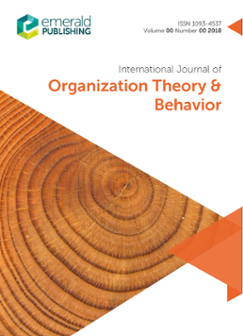Table of contents
The behavioral reactions of victims to different types of workplace bullying
Nikola Djurkovic, Darcy McCormack, Gian CasimirThe relationships between different types of workplace bullying and the reactions of victims were examined using six categories of bullying (threat to professional status…
The challenge of critical theory for those in organization theory and behavior: an overview
Adrian N. CarrThe article questions what is meant by the term critical theory and discusses some common misconceptions that have arisen about the meaning of this term. The dialectic logic that…
Beyond the mainstream: foucault, power and organization theory
Charles F. AbelWhile mainstream organization theory has contributed to making organizations a productive part of society, they have simultaneously contributed to the creation of a “dark side” of…
Critical theory and the role of citizen involvement in environmental decision making: A re-examination
Curtis Ventriss, Walter KuentzelMuch of the administrative literature on public participation in environmental decision making assumes that citizen involvement contributes to reflexive deliberations…
Critical social science and conflict transformation: opportunities for citizen governance
Nancy Meyer-EmerickCritical theory has rarely articulated an agenda for social change linking theory to practice. This paper provides several examples of “critical theory in practice” and focuses…
Critical theory, institutions, and hegemony: role obligation and the reconciliation of seemingly incompatible goals
Arthur J. SementelliLiterature on critical and institutional theories are often perceived to be incompatible, despite a shared conceptual grounding. By clearly defining and understanding the concepts…

ISSN:
1093-4537Online date, start – end:
1998Copyright Holder:
Emerald Publishing LimitedOpen Access:
hybridEditor:
- Associate Professor Davide Secchi